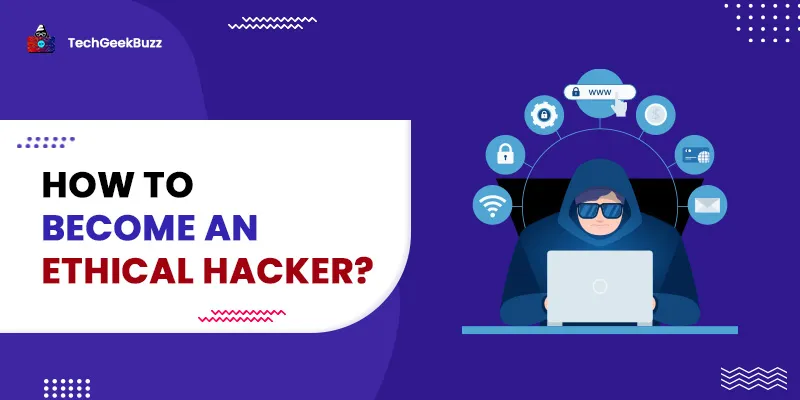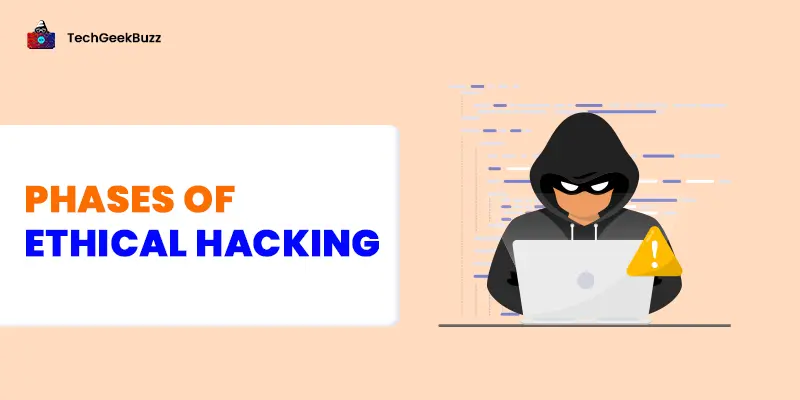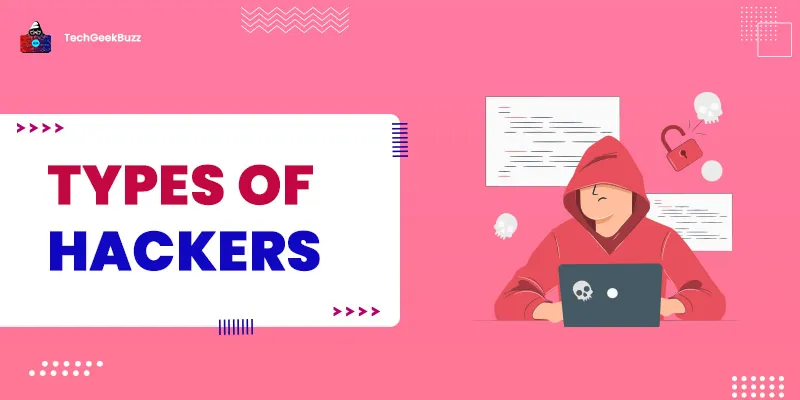The frequency of cybercrime has increased drastically with the emergence of new technologies. Cybercriminals are targeting many renowned organizations and companies, putting them in great financial as well as data loss. They employ multiple techniques and processes to gain access to an organization’s IT infrastructure with the aim of stealing data or completely destroying it.
With the need to protect an organization’s IT assets from being hacked, the role of ethical hackers comes into play.
Ethical hackers are IT professionals who safeguard an organization’s IT assets against different types of cyber threats. They leverage the same techniques, tools, and processes the threats actors or hackers utilize, but legitimately.
Moreover, ethical hackers can save organizations from getting into significant losses that can be caused by cyber attacks. As a result, they are highly sought-after by companies and organizations.
So, if you are thinking of becoming an ethical hacker but have no idea where to start, this article is for you.
In this article, we will guide you on how to get started to become an ethical hacker. But before that, let us first have a brief discussion on ethical hacking.
What is Ethical Hacking?
Ethical hacking is a practice of intentionally breaking into the target system by using the same techniques, tools, and practices the hackers use, but in a legit manner. In other words, it is an authorized practice of gaining access to a specific system, application, or network to uncover security vulnerabilities even before malicious hackers exploit them.
Who Are Ethical Hackers?
Ethical hackers are professionals who carry out the practice of ethical hacking. Though they hack the systems as the threat actors do, we call them ethical hackers because they do it with permission and ethically. Their intent is not to gain access to private information or compromise the entire system. However, they break into the systems to identify the security weaknesses that hackers can take advantage of.
As a result, organizations hire ethical hackers to gain in-depth insights into their IT infrastructure’s security exposures. In addition, ethical hackers employ different forms of risk management and security analysis, such as penetration testing , web application testing, operating testing, and network security testing.
Roles and Responsibilities of an Ethical Hacker
In order to perform hacking legally, there are certain roles and responsibilities of an ethical hacker, as follows:
- Seek permission from the organization’s authority before carrying out any security assessment on any system.
- Identify security vulnerabilities in the target system and fix them so hackers cannot leverage them to break into the system.
- Document all the detected vulnerabilities, bugs, and potential threats that the system could suffer from.
- Maintain the detected vulnerabilities safe and not share them with others.
- Sign an agreement stating that they should keep all their findings and observations as well as an organization’s confidential data safe with them.
10 Essential Steps to Becoming an Ethical Hacker
To become an ethical hacker, which is one of the most lucrative careers, one needs to develop a wide range of expertise that requires significant effort. The following is a step-by-step guide on how to become an ethical hacker:
1. Master Linux/UNIX
Linux/UNIX operating systems are known for their security. In addition, hackers primarily leverage Linux systems to perform attacks. As ethical hackers mimic the actual cyber attacks, they do it using Linux systems because they are open-source, portable, compatible with popular hacking tools, and offer flexibility. So, having hands-on experience working with Linux/UNIX OS is a must skill to become an ethical hacker.
Popular Linux distributions available are Kali Linux, Red Hat Linux, and Ubuntu . Out of these three distributions, Kali Linux is the most preferred choice of hackers as it is specially customized for the hacking purpose.
2. Gain Hands-on Experience in C
C is the mother of all programming languages, and it forms the basis for Linux/UNIX operating systems as they are developed in C. So, to use these systems the way you desire for the hacking purpose, mastering the C programming language will provide you with the ability to do so.
To have the upper hand, you must consider learning some programming languages. This is because an ethical hacker needs to dissect and analyze the code that hackers inject into the target system in case of injection attacks. Therefore, having sound knowledge of two to three programming languages would make it easy for code analysis.
The following are some popular programming languages that you should learn to become an ethical hacker:
- Python : It has its application in exploit writing.
- SQL : It is ideal for hacking large databases.
- PHP : It helps ethical hackers to fight against malicious attackers.
- JavaScript : It is used for hacking web applications.
3. Learn How to be Anonymous
Another skill you need to learn to become an ethical hacker is to perform online activities anonymously. This means that you should be able to hide your online identity so that you leave no trace of your online activities and no one can backtrace you.
Some of the most promising approaches to keeping your online identity hidden and safe are Anonsurf, Proxychains, and MacChanger, which are tools that provide online anonymity.
4. Champion Networking Concepts
Since hacking involves playing around with the network, you must have profound knowledge of various networking concepts and also how the network is created. With an in-depth understanding of networking protocols, you will be able to exploit vulnerabilities and identify what type of attacks the system can undergo.
The following are some significant network topics that you must master to become an ethical hacker:
- Simple Network Management Protocol
- TCP/IP Network
- Subnetting
- Domain Name System (DNS)
- Wireless Networks
- Bluetooth Networks
- SCADA Networks (Modbus)
- Network Masks and CIDR
- Address Resolution Protocol (ARP)
- Automobile Networks (CAN)
Along with the concepts mentioned above, you should be familiar with various networking tools, such as Wireshark, Nmap, and many others.
5. Learn Cryptography
Cryptography, often known as cryptology or secret writing, is a technique of securing information or messages under hostile circumstances by leveraging code so that the person to whom it is intended can understand and process it. The etymology for cryptography is crypto means hidden, and graphy refers to writing, i.e., hidden writing or secret writing.
The sender transmits the encrypted message to the receiver, which is encryption. This means that the sender converts the plain text message into something meaningless called ciphertext. Upon receiving the ciphertext, the receiver decrypts it into plain text in order to understand its true meaning. This process is called decryption.
A strong understanding of cryptography is essential for an ethical hacker since it assures the security of sensitive data as well as its integrity. Furthermore, important data is frequently encrypted when transmitted across a network; therefore, it's important for ethical hackers to know how to spot and break encryption.
6. Gain Insights into Hidden Web
The hidden web, also known as the dark web or invisible web, is the name used to represent web pages that standard search engines do not index. In order to access such web pages, you may require special authorization. However, there are anonymous browsers, such as Tor, that can provide access to the hidden web.
Moreover, this dark or hidden web is the hotbed for threat actors. However, it is important to note that everything on the hidden web is not illegal; it has a legitimate side too. As a result, ethical hackers must delve deep into understanding the working of the dark web.
7. Explore Vulnerabilities
Vulnerabilities are simply the loopholes or flaws that malicious hackers can leverage to curry out to break into a particular system. The core job of ethical hackers is to determine vulnerabilities and susceptible spots in the target system. As a result, it is essential for them to know everything about vulnerabilities.
Also, as an ethical hacker, you must know how to scan the systems and networks to uncover their weaknesses that could lead to security breaches. Today, a lot of vulnerability and malware scanning tools are available out there that assist ethical hackers in scanning networks and systems effectively.
The following are some of the most popular vulnerability scanning tools for Kali Linux:
- OpenVAS: Use this tool to uncover vulnerabilities on devices within a network.
- Wapiti: It helps you identify vulnerabilities in web applications that can lead to injection attacks, such as XSS or SQLi.
- Nikto: It discovers security weaknesses on web servers.
- Nessus: Use this tool to find security spots in web applications and many other systems.
- Nmap: It lets you scan your network for vulnerabilities.
8. Dive Deeper into Hacking
After learning all the above basic topics, you should now move on to diving deeper into hacking concepts. These concepts include penetration testing, vulnerability assessment, database engines, different cyber threats and methods to defend them, client-side attacks, server-side attacks, and many others.
Moreover, check the target system regularly for any security changes. You must always stay updated regarding the latest tools and techniques for hacking and securing systems.
9. Practice
Practicing or implementing what you learned is the best way to gain hands-on experience in hacking. As an ethical hacker, you need to practice in various environments and also in different situations. You should work with different tools and implement various hacking techniques. Along with practicing, try experimenting with new things so that you can discover something new.
10. Join Forums For Discussion
When you communicate with other experienced or novice ethical hackers, you get something new to learn, or you can share your knowledge with them. In short, you can have discussions with other ethical hackers or work together. You can find a lot of ethical hacker communities on Facebook, Telegram, or other platforms where you can connect with other ethical hackers across the globe.
Education and Certifications for Ethical Hackers
To become an ethical hacker, you must first pursue a bachelor’s degree, specifically a computer science degree. This is because many companies prefer candidates holding a bachelor’s degree. Further, you can consider pursuing a certification that showcases your ethical hacking skills and increases your chances of getting hired.
There are renowned organizations that offer ethical hacking certifications. They are as follows:
1. EC Council
The International Council of Electronic Commerce Consultants (EC Council) is a popular organization that provides more than 20 cybersecurity certification programs. It also provides various cybersecurity services.
This organization offers one of the most popular cybersecurity certifications, CEH (Certified Ethical Hacker). Some other certifications from EC Council include
- Certified SOC Analyst
- Certified Penetration Testing Professional
- Web Application Handling and Security
- Certified Cybersecurity Technician
- Encryption Specialist
2. CompTIA Security+
The Computing Technology Industry Association is a non-profit trade association that issues certifications for the IT domain. It is among the best trade associations in the world. It provides three different cybersecurity certifications that help you become an ethical hacker. They are as follows:
- CompTIA CySA+
- CompTIA CASP+
- CompTIA PenTest+
3. International Information System Security Certification Consortium (ISC)²
(ISC)² is yet another non-profit organization that trains individuals to gain cybersecurity skills. It is the world’s largest IT security organization. You can find multiple cybersecurity certifications depending on your experience and skills.
This organization offers the Certified Information Systems Security Professional (CISSP) certification to help you master cloud security, security administration, and authorization.
After earning certifications, start working as an intern in any organization to gain hands-on experience. You would gain a vast amount of knowledge and skills from working as an intern. Later, you can move on to working as an ethical hacker in large companies and organizations.
Career Outlook for Ethical Hackers
The increasing rate of cyber attacks has resulted in the increasing demand for ethical hackers. Many renowned companies have experienced major cyber threats, putting every other organization into investing in IT security solutions so that they can prevent losses caused due to cyber threats. So, organizations are hiring white hat hackers to prevent threats from black hat hackers.
Salary Insights of an Ethical Hacker
Ethical hackers earn sky-high salaries like other professionals in the IT industry. The following table highlights the average salary insights of an ethical hacker in different countries:
|
Country |
Average Salary Per Annum |
|
India |
?578K |
|
United States |
$80K |
|
The United Kingdom |
£39k |
|
Canada |
CA$60k |
|
France |
€45k |
|
Australia |
AU$83k |
Conclusion
Becoming an ethical hacker requires you to possess a wide range of expertise, as we have mentioned in this article. Once you learn all the hacking concepts, start implementing and practicing them and master the hacking techniques. Further, move on to pursuing certification to validate your hacking skills. Finally, search for your dream job and appear for an interview for the same.
Good Luck!
People are also reading:



![What is a White Hat Hacker? [Definition, Tools, & Techniques]](/media/new_post_images/White_Hat_Hacker.webp)

Leave a Comment on this Post